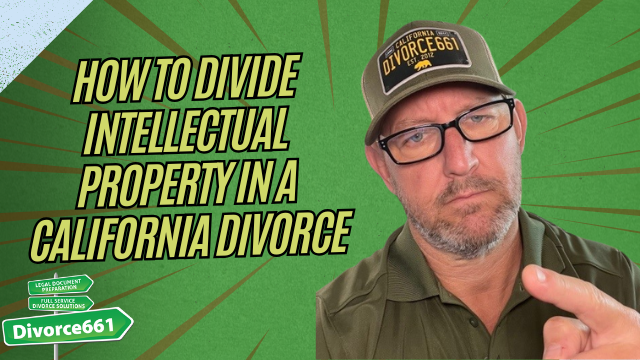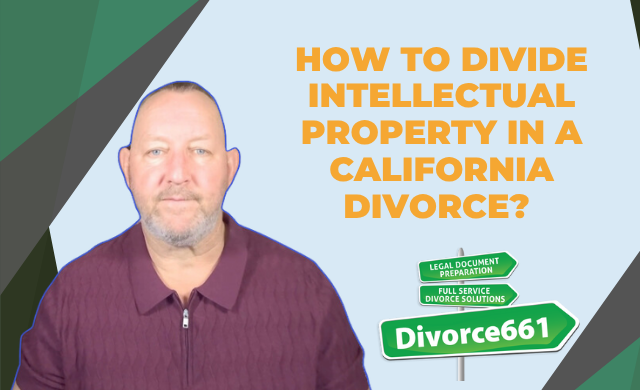How to Divide Intellectual Property in a California Divorce
If you or your spouse created something valuable during your marriage, such as a book, artwork, software, or a brand, you are probably asking what happens to that intellectual property in a California divorce. Intellectual property can be a high value but complex asset to divide. Below I break down how California treats IP, what matters for valuation, and practical options for dividing creative work so you can protect your rights and reach a fair outcome.
Why intellectual property matters in a divorce
Intellectual property can produce ongoing income through royalties, licensing, or product sales. It can also represent significant future earning potential even if it is not yet earning money. That is why IP created during a marriage often needs careful treatment in divorce settlements.
In California, intellectual property created during the marriage is generally considered community property.
That basic rule means IP developed while married is presumptively shared, even if one spouse did most of the work. The critical questions are when the IP was created and what its value is now and in the future.
Key factors in dividing IP in California
- Date of creation and development: Was the idea or work created before the marriage, during the marriage, or after separation? Timing affects whether it is community property, separate property, or a mix.
- Contribution during the marriage: Who did the creative, technical, marketing, or management work? Even if one spouse did most of the work, the community may still have an interest if it was developed during the marriage.
- Current and future value: Is the IP already generating income through royalties or sales? What is the reasonable expectation for future income? These projections matter for fair division.
- Type of intellectual property: Copyrights, trademarks, patents, trade secrets, and digital assets are treated differently in practice. Each may require specific valuation methods and contractual language.
Types of IP and how they are handled
Not all intellectual property is the same. Here is how common types are generally addressed in a divorce.
- Royalties and copyrights: Ongoing royalty streams are treated as income producing community assets. Valuation often uses present value of future royalties.
- Trademarks and brands: A brand may have value based on customer recognition and sales potential. Division can involve buyouts, licensing arrangements, or profit sharing.
- Patents and inventions: Patents may require expert valuation for potential licensing income and market worth.
- Software and digital products: Software, apps, and digital courses can have complex revenue models. Valuation should account for recurring revenue, user base, and growth potential.
Valuation is critical
Accurately valuing intellectual property is often the most important and disputed part of dividing IP. You can not simply split an idea. You need a realistic estimate of current worth and projected future earnings. That may require business valuation experts, forensic accountants, or IP specialists.
Without a proper valuation you risk an unfair settlement. A spouse who created a brand or product during the marriage may understandably want to keep control, but the noncreator spouse may still be entitled to a share of the community interest.
Practical solutions: buyouts, licenses, and split ownership
There are several ways to resolve IP division while protecting both parties future interests.
- Buyout: One spouse pays the other a lump sum or structured payments in exchange for full ownership and control. This is common when the creator wants to retain control and the other spouse wants compensation for the community interest.
- Licensing agreement: The creator keeps ownership but grants the former spouse a license to receive a portion of income for a set period or under certain terms.
- Profit sharing: The parties agree to share future revenues according to a formula. This requires clear accounting rules in the settlement to avoid future disputes.
- Joint ownership with defined roles: For ongoing businesses, the settlement can define decision making, management authority, and how profits are distributed.
Real case example
We helped a client whose spouse launched a digital brand and product line during the marriage. Although most of the work was done by one person, the brand and its future income potential were community assets. We accounted for that future income and structured a fair buyout so the creator could retain full control moving forward while the other spouse received appropriate compensation. The settlement included specific language to avoid future disputes over revenue accounting and control.
What to include in your divorce agreement to avoid future disputes
When IP is involved, the written agreement should be precise. Include wording that covers:
- Exact intellectual property being divided, including registrations and applications
- Effective date of creation and any separate property claims
- Valuation method used and buyout numbers or revenue share formulas
- Payment schedule and remedies for missed payments
- Control, management rights, and licensing terms
- Accounting and audit rights to verify income
- How new related IP developed after the divorce will be handled
How to protect your creative work during a divorce
- Identify every piece of intellectual property and related agreements, registrations, and revenue streams.
- Collect documentation showing when development started and any pre marriage contributions.
- Get professional valuations for patents, trademarks, brands, and businesses that include projected income.
- Negotiate clear settlement language that covers control, revenue splits, licensing, and enforcement.
- Consider a buyout when one spouse wants sole control but recognize that buyout amounts should reflect the community interest.
How I can help
If your divorce involves creative work or intellectual property you want handled correctly, I can help you identify and address those assets. I work with experts in valuations and draft settlement language to avoid future disputes. We offer flat fee services and 100 percent remote support across California.
To get started, schedule a free consultation at Divorce661.com. If you want to discuss your IP, take the first step and book a consultation at https://divorce661.com/divorce661-consultation/
Final thoughts
Intellectual property created during a marriage is generally treated as community property in California. The work you put into a book, artwork, software, or brand matters, but so does the community interest in the asset. Proper valuation and carefully drafted settlement language are essential. With the right approach you can protect your creative work and reach a fair resolution.


